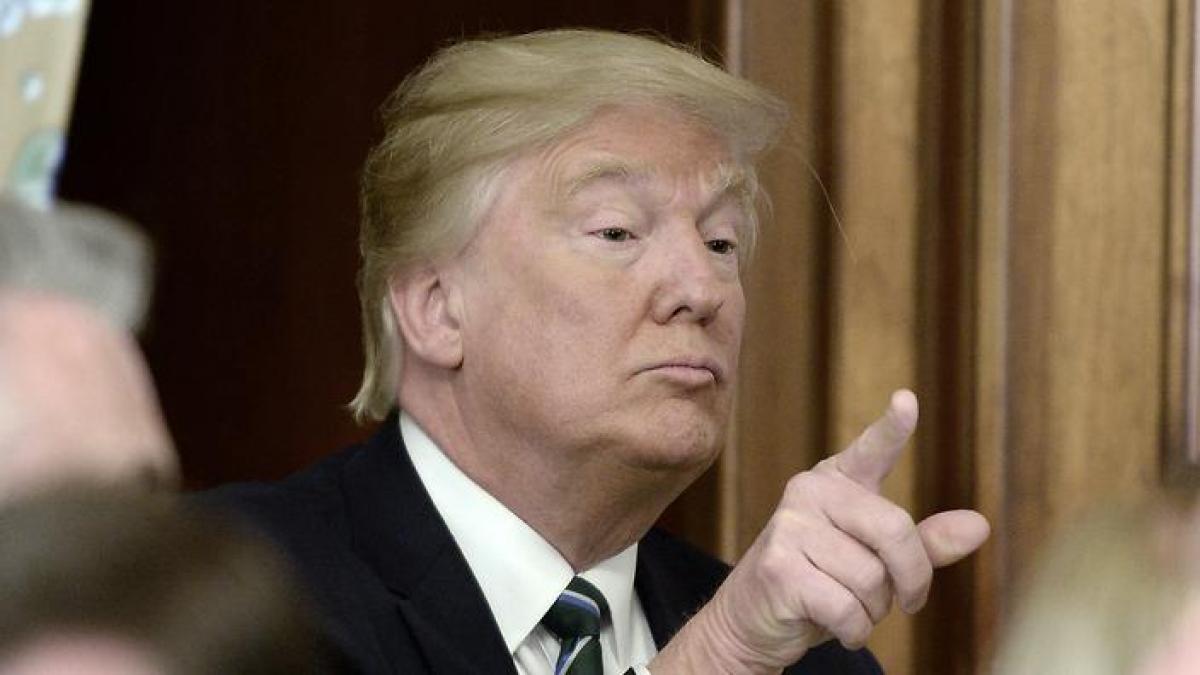Live
- Stokes motivates his team to put in extra effort, says England pacer Potts
- From overcoming setbacks to leading India in U19 Women’s Asia Cup, Niki Prasad's amazing journey
- Constitution debate: PM Modi hails 'Nari Shakti'; makes strong pitch for 'United Bharat’
- Bihar: Inquiry initiated against principal who went to buy veggies during school hours
- TN: DMK postpones executive meet due to heavy rains & Parliament session
- Porous silicon oxide electrodes can fix durability issues in batteries: Researchers
- Jalandhar civic polls: AAP promises launch of 100 e-buses, round the clock water supply
- Economic upliftment of rural women is priority of Tripura govt: CM Saha
- Rajmata Jijabai Trophy: Manipur move to top of the table, T.N register first win
- Italian envoy Baroli hoping to strengthen ties with India through football
Just In

US President Donald Trump\'s proposed 2018 budget would slash funding for science, health and environmental programs at home and abroad, sparking an outcry on Thursday among experts who say the cuts would endanger the planet.
US President Donald Trump's proposed 2018 budget would slash funding for science, health and environmental programs at home and abroad, sparking an outcry on Thursday among experts who say the cuts would endanger the planet.
The blueprint, which also includes sharp cuts in spending on the arts and foreign aid, has yet to undergo scrutiny in Congress and must be approved by lawmakers before it can take effect.
But environmentalists swiftly lashed out at the plan, calling it "shocking," and "drastic," particularly for the way it trimmed science programs while boosting defense spending by $52 billion.
A key target was the Environmental Protection Agency (EPA), which would get $5.7 billion, a 31 per cent cut compared with 2017 levels. Some 3,200 jobs at the agency would be eliminated, about one-fifth of its workforce.
The proposal called for an end to funding both former president Barack Obama's Clean Power Plan and international climate-change programs in order to save $100 million for American taxpayers.
The United States typically contributes about $4-6 million per year to help fund the UN Framework Convention on Climate Change, about 20 per cent of its budget.
UNFCCC spokesman Nick Nuttall said "we understand that approval of such a budget can be a long and complex process and we will follow it with interest."
Zeroed out
Under the EPA cuts, major programs to restore the Chesapeake Bay and Great Lakes would end, along with a popular program to certify environmentally friendly appliances with the Energy Star label.
Some $250 million in programs aimed at protecting coastal life would be "zeroed out" for the National Oceanic and Atmospheric Administration, including research and education run by a program called Sea Grant.
Overall, NOAA could reportedly face as much as a $990 million cut from its annual budget.
"The message the budget sends is that our ocean - the engine that drives an economy worth $359 billion and supports millions of people - is simply not a priority for the Trump administration," said Addie Haughey, associate director of government relations at Ocean Conservancy.
"It is cutting bone-deep into the lives, livelihoods and safety of hundreds of thousands of coastal communities from Alaska to Hawaii, Oregon to Florida."
Jacqueline Savitz, senior vice president at the advocacy group Oceana, called on Congress to reject the cuts.
"Funding cuts of this magnitude could cripple key agencies like NOAA and the Coast Guard, which would be devastating to decades of ocean conservation," she said.
"These federal agencies, and the budgets that support them, allow our nation's bedrock conservation laws to sustainably manage our fisheries, protect marine mammals and endangered species, preserve marine habitats, clean up oil spills and so much more."
Asteroid study axed
The main engine for US medical health research, the National Institutes of Health, would lose $5.8 billion, or about 18 per cent, bringing its 2018 budget to $25.9 billion.
Four NASA Earth science missions would be shuttered.
Three satellite programs aimed at studying climate change and oceans would never launch.
The fourth - a deep-space Earth observing mission known as DSCOVR which was launched in 2015 and was initially the brainchild of former US vice president Al Gore - would have its cameras turned off.
NASA would also be forced to abandon its plan to lasso an asteroid and coax it into a lunar orbit for study by a human crew sometime in the 2020s.
Otherwise, NASA's budget was left largely intact. It was trimmed by less than one per cent.
NASA administrator Robert Lightfoot described the plan as "a positive budget overall for NASA."
But Greenpeace spokesman Travis Nichols had harsher words for the broader White House plan.
"The Trump administration clearly sees corporations as its true constituents, not the people of this country," said Nichols.
"This is a budget proposal that fully reveals the Trump administration's corruption, cynicism, and small-mindedness."
Manish Bapna, managing director of the World Resources Institute, agreed.
"The latest budget continues the administration's shocking disregard for priorities that are critical for people's health and the economy," said Bapna.
Prior to these proposed cuts, international, environment, science and energy programs combined accounted for only three per cent of federal spending, said Bob Perciasepe, president of the Center for Climate and Energy Solutions.
"We urge Congress to avoid drastic cuts," he said.
"We should be enhancing programs that contribute to quality of life and health, US economic leadership, and long-term security. Inaction on climate today will lead to greater costs tomorrow."

© 2024 Hyderabad Media House Limited/The Hans India. All rights reserved. Powered by hocalwire.com







